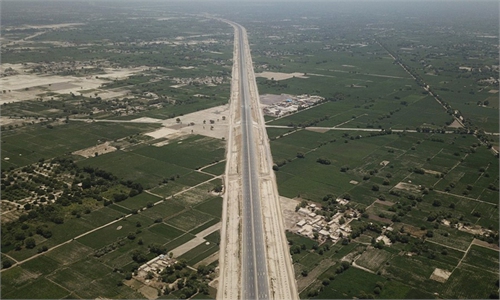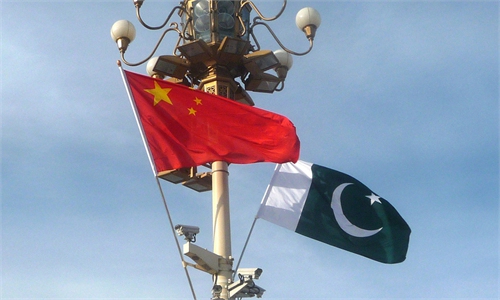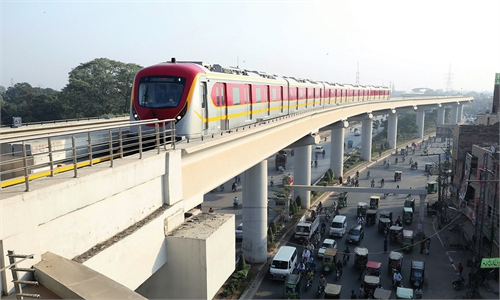China-Pakistan trade relations further deepen as enterprises from two sides establish stronger ties
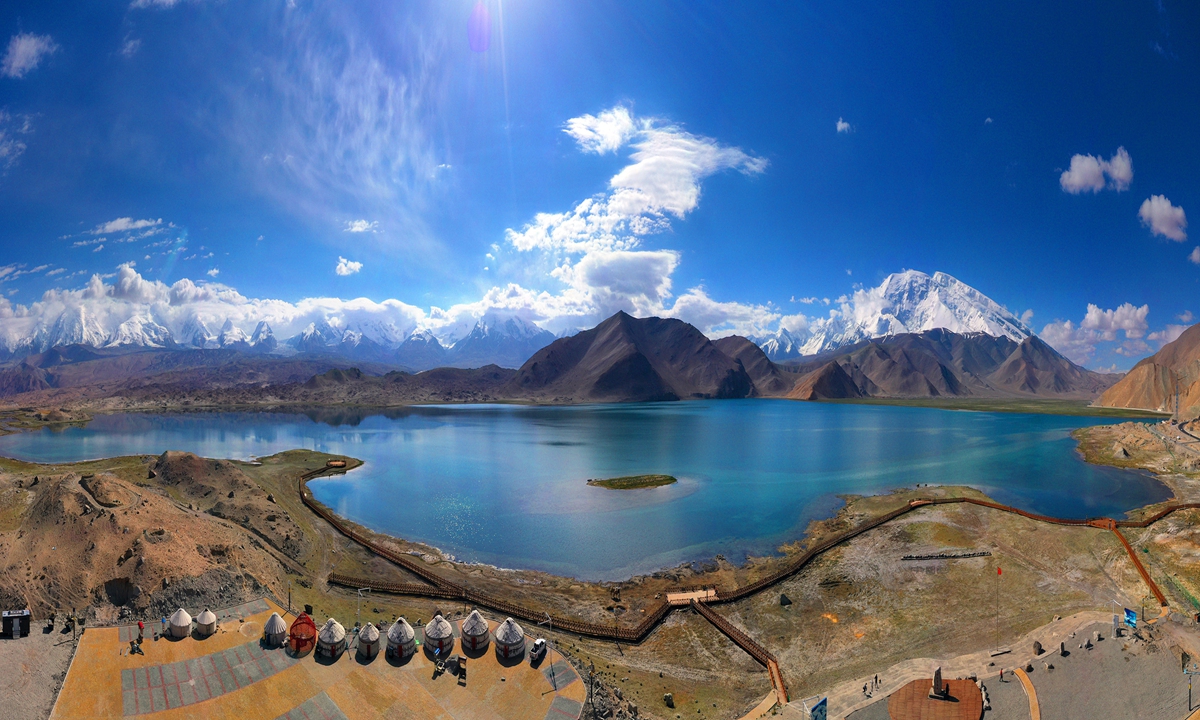
A view of the Karakul Lake on the Karakoram Highway (KKH) in Northwest China's Xinjiang Uygur Autonomous Region on June 8, 2021. The KKH is the only land route linking Pakistan with China. Photo: VCG
The operations of Chinese enterprises in Pakistan remain normal with both sides strengthening protection for Chinese nationals, a source close to the matter who asked to remain anonymous told the Global Times at a forum in Beijing on Thursday, adding that the Pakistani military has been providing protection for local Chinese enterprises including his company, and the Chinese embassy in Pakistan has warned Chinese nationals not to go out unless necessary, according to the source.
The move came after nine Chinese and four Pakistanis were killed in a shuttle bus blast on July 14 in Kohistan region in northern Pakistan and the blast was confirmed to be a terrorist attack on July 16. The construction of the Dasu hydropower station in Pakistan has since been suspended, according to China's Foreign Ministry.
The impact of the recent attacks will subside eventually and will not affect trade between the two countries and China-Pakistan cooperation projects under the Belt and Road Initiative (BRI), a Pakistan diplomat told the Global Time at the 2021 China-Pakistan Trade Forum on Thursday, emphasizing that Pakistan is giving maximum priority to the safety of Chinese nationals.
The Pakistani Foreign Ministry issued a statement on Wednesday stating that Pakistan attaches great importance to safety and security of Chinese nationals, projects and institutions in Pakistan.
Pakistan aims to boost the trade between the two countries, and welcomes more Chinese traders and further enhances cooperation in trade and business with China, according to Pakistan officials at the forum.
Pakistan could overtake India in trade with China in just eight years, even though its trade volume with China was only one-fifth of India's in 2020 as the relationship between the two countries has become stronger and investment has been increasing, recording a 34 percent hike in exports from Pakistan to China year-to-date, Badar U Zaman, commercial counsellor of the Embassy of Pakistan in Beijing, told the Global Times on Thursday.
"India has a population five to six times larger than that of Pakistan, so I hope that it will take eight to 10 years to overtake them," said Zaman.
The 2021 China-Pakistan Trade Forum took place in the Pakistani Embassy in Beijing on Thursday even under the impact of recent attacks, amid the 70th anniversary of establishment of diplomatic ties between the two countries, setting to strengthen the bilateral trade relationships, attract more Chinese traders and promote high-quality products from Pakistan in China
Given the two country's iron-clad relationship and the substantial progress already made in construction of the multi-billion-dollar China-Pakistan Economic Corridor (CPEC), projects could provide economic propulsion to boost bilateral trade, said analysts.
Multiple Chinese enterprises from a variety of industries have settled in Gwadar Port in Pakistan, which have been cooperating with local companies across different industries such as fisheries by providing them with refrigeration equipment and processing equipment, Liu Zongyi, secretary-general of the Research Center for China-South Asia Cooperation at Shanghai Institutes for International Studies told the Global Times on Sunday.
Liu noted that high-quality seafood products from the Gwadar Port now can be directly shipped to Northwest China's Xinjiang Uygur Autonomous Region as CEPC has provided improved infrastructure for the country.
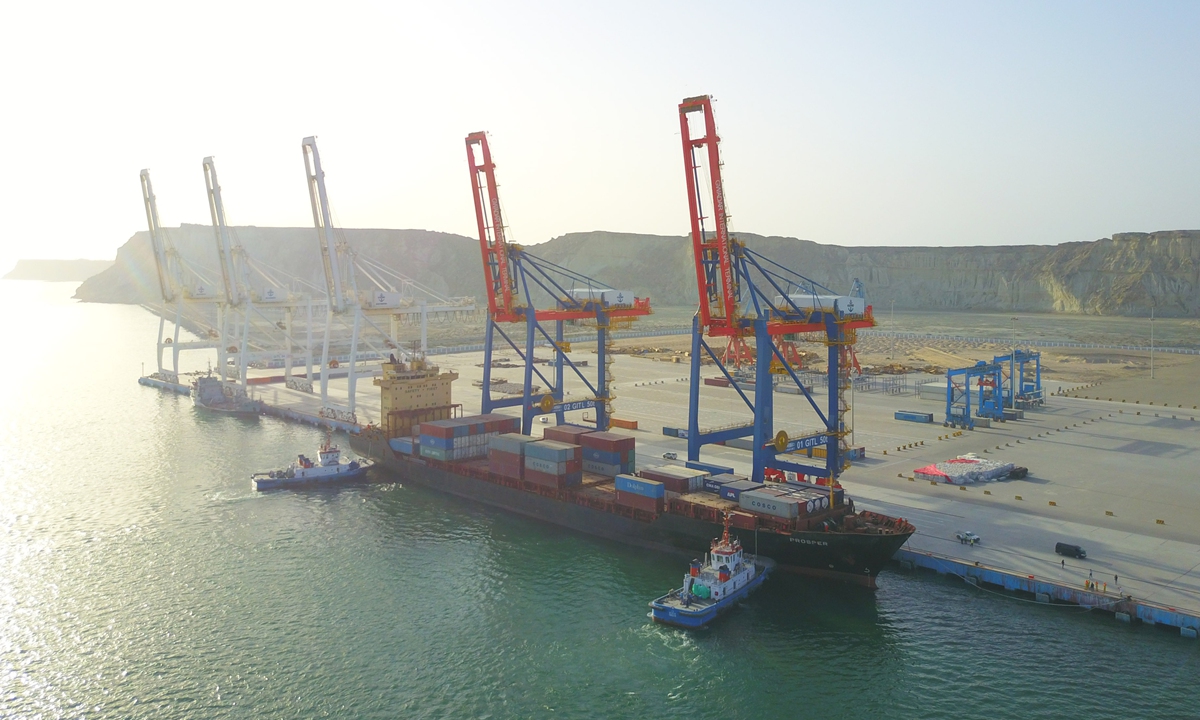
A container ship docks at the Gwadar port in Pakistan. Photo: Xinhua
Pakistan's exports to China in the first quarter of 2021 totaled $888 million compared with $526 million during the same period in 2020, a year-on-year increase of 69 percent, Moin ul Haque, Pakistani Ambassador to China, tweeted in May.
The construction of the first industrial park under the CPEC framework has entered the full construction phase in Pakistan's Rashakai Special Economic Zone in May, as the strategic location of the Rashakai Special Economic Zone gives it great potential to develop export-oriented industries for Central Asia, per media reports.
Chinese scholars studying China-Pakistan relations also pointed out there are still spaces for both China and Pakistan to further deepen the bilateral trade, while Pakistan's exports to China have been booming since 2020 as China's imports from Pakistan reached $2.12 billion, an increase of 17.5 percent from the previous year, according to data from the Ministry of Commerce.
There could be more collaboration for enterprises from two sides in developing and manufacturing products together as there are only a handful of projects and products jointly funded and delivered by companies from the two countries, said Zhou Rong, a senior researcher at the Chongyang Institute for Financial Studies at Renmin University of China.
Zhou vowed that "made in China" has the potential to turn into "made in CPEC" since a large amount of Chinese capital especially of which from private enterprises can be invested to manufacture products jointly with Pakistani enterprises.
Such collaboration could also help Pakistan to upgrade its design and manufacturing in production in a bid to expand its overall exports.
Liu echoed Zhou's opinion emphasizing that China has been cooperating with Pakistan to develop its industries not only to boost Pakistan's exports to China, but also to help the country become a manufacturing base and industrial hub especially in manufacturing to increase Pakistan's exports to the rest of the world.
Experts noted that China has been working closely with some of traditionally strong industries in Pakistan such as cotton, textiles, and agricultural by offering technical skills training and exporting advanced equipment to Pakistan, as such industries could provide some of the potential items Pakistan could export to China including cotton, sugar, mango, and textile products which there is a great demand in China.
Moreover, Pakistani enterprises building closer ties with Chinese companies could promote more high-quality products to be exported to China as well, which have not been widely recognized by Chinese consumers including large-sized bath towels, soccer balls, generic drugs and generic medical products, said Zhou.
As of the end of 2020, there were a total of 70 projects under the CPEC - a landmark project of the BRI launched in 2013 - with 46 projects have been completed or under construction, the People's Daily reported in December.
China has been Pakistan's biggest trade partner for six consecutive years since the 2015 fiscal year. China is also Pakistan's main source of imports and second-largest export destination, according to data from the Economic and Commercial Office of the Chinese Embassy in Pakistan.

